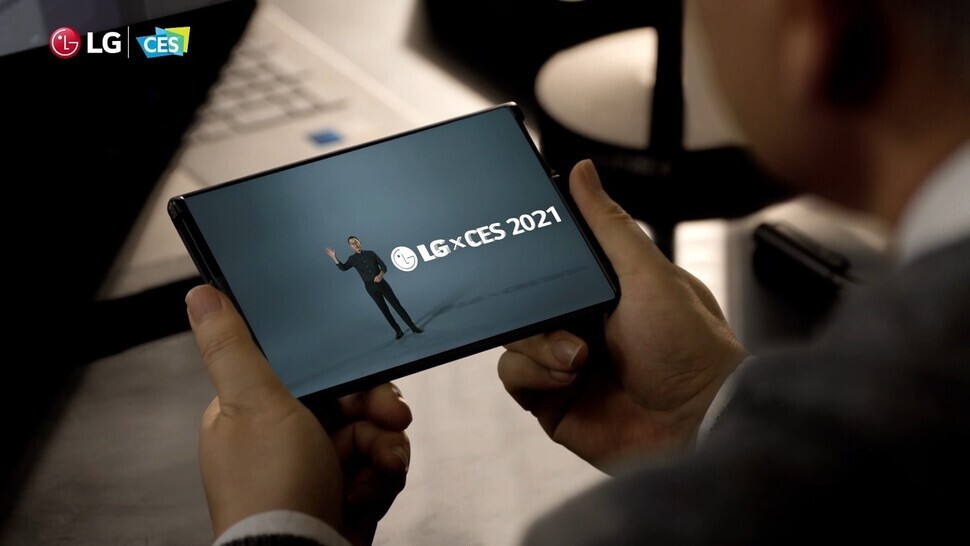hankyoreh
Links to other country sites 다른 나라 사이트 링크
LG pulls out of mobile phone market

LG Electronics has decided to wind down its mobile phone unit, the company announced on Monday.
Having never recovered from the shock of the iPhone’s arrival in 2007, LG couldn’t manage to come up with anything to carry on the mantle of its past successes with the Chocolate and Prada. The world will never again get to see the rollable phone that stunned the world this past January at CES 2021, the world’s largest telecommunications and appliance show.
“On the premium mobile phone market, two companies have established themselves as increasingly dominant, and the cost competition has intensified as major competitors have launched a focused campaign for the entry-level mobile phone market,” it said. “LG Electronics has failed to produce results due to an inadequate response.”
The company’s explanations of its reasons for shutting down the unit amounted to a confession of its missteps.
In the five years between 2016 and 2010, mobile unit sales dropped by half, plunging from 11.7 trillion won (US$10.4 billion) in 2016 to 5.21 trillion won (US$4.6 billion) in 2020. Profitability also took a major hit, with operating losses registered for 23 straight quarters — five years and nine months — since the second quarter of 2015.
The mobile unit has been a key factor in terms of pressure on LG Electronics as a whole. For years, market observers have concluded on that basis that the closure of its mobile phone unit was merely a matter of time.

In 2007, the mobile phone market underwent a historic shift toward smartphones. But for the next decade or so, LG Electronics struggled to find a clear avenue forward.
In the high-end phone market, it was unable to break through the stranglehold by Apple and Samsung Electronics. In the lower-end market, it failed to defend itself against the onslaught of Chinese rivals boasting cost-competitiveness, including Oppo, Vivo and Xiaomi.
Park Jea-gun, a Hanyang University professor who chairs the Korean Society of Semiconductor & Display Technology, said, “LG Electronics has been focusing on the premium market, but since it wasn’t able to catch up with Samsung Electronics or Apple in that market, it eventually had to shut the unit down.”
LG Electronics had the three options of reducing the unit’s scale, selling it off or pulling out of the market. Many are focusing on the reasons behind its decision to take the third option.
Some analysts said it reflected a combination of job retention concerns and the possession of core mobile technology. In a telephone interview with the Hankyoreh, Kim Jong-ki, director of the new industry office at the Korea Institute for Industrial Economics and Trade, said, “LG Electronics may have wished to sell off just its production unit, while retaining source technology such as mobile patents.”
“Whoever acquired it would have wanted to also acquire the core technology and its high value-added, and it seems like there was a serious difference in views in that regard,” he added.
LG Electronics also announced that same day that it would be “continuing with research and development on core mobile technology to prepare for the future,” noting that “6G mobile communications, cameras, software and so forth are essential capabilities for next-generation televisions, appliances, electronic components and robotics.”
“After considering all the possibilities, we concluded that closing the unit would clearly be of strategic benefit from an intermediate- to long-term standpoint,” it said.
The market response has been relatively positive.
In a report published on March 26, Kim Woon-ho, an analyst with IBK Investment & Securities, predicted that LG Electronics “can reduce operating losses amounting to nearly one trillion won (US$890 million) annually simply by winding down its mobile unit.”
The company’s stock prices have risen ever since the possibility of the unit’s closure was first mentioned in January, climbing from around 135,000 won (US$120) per share to nearly 200,000 (US$178) won at one point. The trend reflects the hopes that the unit’s shutdown will strengthen future growth drivers for LG Electronics.
As of Monday, however, the company’s shares were trading at 154,500 won (US$137), down 2.52 percent from the previous trading day.
Employees in the mobile unit are to be reassigned to other departments and affiliates. As of late 2019, 3,449 people were employed in the mobile phone unit.
By Song Chae Kyung-hwa, staff reporter
Please direct comments or questions to [english@hani.co.kr]

Editorial・opinion
![[Editorial] Yoon must halt procurement of SM-3 interceptor missiles [Editorial] Yoon must halt procurement of SM-3 interceptor missiles](https://flexible.img.hani.co.kr/flexible/normal/500/300/imgdb/child/2024/0501/17145495551605_1717145495195344.jpg) [Editorial] Yoon must halt procurement of SM-3 interceptor missiles
[Editorial] Yoon must halt procurement of SM-3 interceptor missiles![[Guest essay] Maybe Korea’s rapid population decline is an opportunity, not a crisis [Guest essay] Maybe Korea’s rapid population decline is an opportunity, not a crisis](https://flexible.img.hani.co.kr/flexible/normal/500/300/imgdb/original/2024/0430/9417144634983596.jpg) [Guest essay] Maybe Korea’s rapid population decline is an opportunity, not a crisis
[Guest essay] Maybe Korea’s rapid population decline is an opportunity, not a crisis- [Column] Can Yoon steer diplomacy with Russia, China back on track?
- [Column] Season 2 of special prosecutor probe may be coming to Korea soon
- [Column] Park Geun-hye déjà vu in Yoon Suk-yeol
- [Editorial] New weight of N. Korea’s nuclear threats makes dialogue all the more urgent
- [Guest essay] The real reason Korea’s new right wants to dub Rhee a founding father
- [Column] ‘Choson’: Is it time we start referring to N. Korea in its own terms?
- [Editorial] Japan’s rewriting of history with Korea has gone too far
- [Column] The president’s questionable capacity for dialogue
Most viewed articles
- 1Months and months of overdue wages are pushing migrant workers in Korea into debt
- 2Trump asks why US would defend Korea, hints at hiking Seoul’s defense cost burden
- 3At heart of West’s handwringing over Chinese ‘overcapacity,’ a battle to lead key future industries
- 4[Editorial] Yoon must halt procurement of SM-3 interceptor missiles
- 5[Guest essay] Maybe Korea’s rapid population decline is an opportunity, not a crisis
- 6Fruitless Yoon-Lee summit inflames partisan tensions in Korea
- 7Dermatology, plastic surgery drove record medical tourism to Korea in 2023
- 8First meeting between Yoon, Lee in 2 years ends without compromise or agreement
- 91 in 3 S. Korean security experts support nuclear armament, CSIS finds
- 10AI is catching up with humans at a ‘shocking’ rate